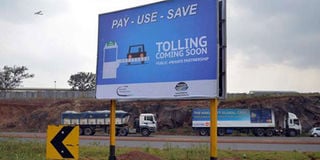Road toll looms on key highways

A billboard erected by the Kenya National Highway Authority on February 10, 2016 on the Southern Bypass, near the Lang'ata Road overpass, indicating the planned toll station on the highway. PHOTO | SALATON NJAU | NATION MEDIA GROUP
What you need to know:
- The projects will be carried out through a public-private partnership plan, where developers will construct, maintain and then charge a fee for using a road they manage.
- Transport Principal Secretary John Mosonik said that for the roads that will be placed under tolling, the funds will now be diverted to developing roads in other parts of the country..
Toll stations will be put up on five major roads in the country in a bid to develop and maintain them better, the government has said.
The Nairobi-Mombasa highway, the Nairobi-Nakuru-Mau Summit highway, Thika Road, Nairobi's Southern Bypass and a second Nyali bridge in Mombasa are targeted in this new development that the government is touting as transformative, arguing they will boost the economy.
The projects will be carried out through a public-private partnership plan, where developers will construct, maintain and then charge a fee for using a road they manage.
During a stakeholders' meeting at the Norfolk Hotel in Nairobi on Monday, Kenya National Highways Authority (Kenha) Director-General Peter Mundinia said the Nairobi-Mombasa and Nairobi-Nakuru highways will be turned into dual carriageways by private developers, who will then begin charging for using them.
TOLL MANAGERS SOUGHT
For already completed roads like Thika Road and the Southern Bypass, the ministry said it would soon advertise for developers to start managing them.
All the major roads to be constructed in this project will be managed by Kenha, but the construction of the second Nyali bridge in Mombasa, which is expected to decongest the island, will be managed by the Kenya Urban Roads Authority.
Mr Mundinia also said tolling stations should be in operation by the third quarter of 2017.
There will be three formats of charging toll fees at tollbooths: a manual format where motorists stop and pay; an electronic system that uses prepaid cards that can be swiped; and a third system in which vehicles may be fitted with tags.
He, however, said the charging formula was yet to be determined.
During the meeting, the fuel levy, a fee included in the cost of fuel and is used to maintain roads, was raised.
“I don’t expect the fuel price to go down, but it will stabilise and not go up. Also, all roads under tolling will not receive any fuel levy money,” said Transport Principal Secretary John Mosonik.
DOUBLE TAXATION?
The fuel levy, he explained, is used only for maintaining roads and not development.
He said that for the roads that will be placed under tolling, the funds will now be diverted to developing roads in other parts of the country.
But Matatu Owners Association chairman Dickson Mbugua opposed tolls, saying it translates to double taxation.
“We are already paying a lot of taxes and charges as matatu owners, this will be punishing us,” he said and asked the government to engage all stakeholders before rolling out the project.
Hassan Kabeberi of the East African Truck Drivers League was also sceptical of the project.
“We are watching from afar to see how it goes but I think this is one of the worst projects the government will ever attempt,” he said.





